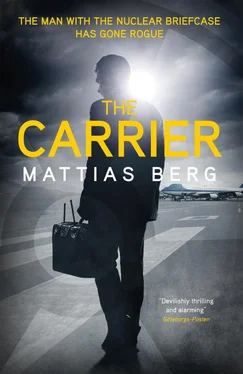Mattias Berg - The Carrier
Здесь есть возможность читать онлайн «Mattias Berg - The Carrier» весь текст электронной книги совершенно бесплатно (целиком полную версию без сокращений). В некоторых случаях можно слушать аудио, скачать через торрент в формате fb2 и присутствует краткое содержание. Город: London, Год выпуска: 2019, ISBN: 2019, Издательство: MacLehose Press, Жанр: Триллер, на английском языке. Описание произведения, (предисловие) а так же отзывы посетителей доступны на портале библиотеки ЛибКат.
- Название:The Carrier
- Автор:
- Издательство:MacLehose Press
- Жанр:
- Год:2019
- Город:London
- ISBN:978-0-85705-788-4
- Рейтинг книги:4 / 5. Голосов: 1
-
Избранное:Добавить в избранное
- Отзывы:
-
Ваша оценка:
- 80
- 1
- 2
- 3
- 4
- 5
The Carrier: краткое содержание, описание и аннотация
Предлагаем к чтению аннотацию, описание, краткое содержание или предисловие (зависит от того, что написал сам автор книги «The Carrier»). Если вы не нашли необходимую информацию о книге — напишите в комментариях, мы постараемся отыскать её.
The Carrier — читать онлайн бесплатно полную книгу (весь текст) целиком
Ниже представлен текст книги, разбитый по страницам. Система сохранения места последней прочитанной страницы, позволяет с удобством читать онлайн бесплатно книгу «The Carrier», без необходимости каждый раз заново искать на чём Вы остановились. Поставьте закладку, и сможете в любой момент перейти на страницу, на которой закончили чтение.
Интервал:
Закладка:
And it is these evil things—thermonuclear weapons, hydrogen bombs—which even to this day stand proudly in position across the surface of the earth. Each and every one of the upward of twenty thousand individual warheads has an explosive force which is at least ten, and in some cases a thousand, times greater than the only nuclear weapons which have ever been used. The atom bombs dropped over first Hiroshima, and then Nagasaki.
3.07
For the weeks that followed, I remained convinced that the incident at Minot must have been simulated. Digital conjuring with the help of the footage Ingrid had managed to take away with her from Esrange, manipulated images streamed from the satellites. Another test of my determination and loyalty.
I never asked her directly—since things never became any clearer when I did. And there was no sign from our pursuers, not even now. No reaction, no counter-move.
Until Edelweiss called.
I knew it had to be him as soon as I heard the ring tone—at 4.00 a.m.
In Edelweiss’ universe, nothing happened by chance. The time of his call fell precisely in the middle of the hour of the wolf on my side of the Atlantic. When we had learned that all people with a normal daily rhythm were at their most vulnerable, the body’s activity level, temperature, blood pressure at its lowest—and the melatonin at its highest. That is why attacks just before dawn had become so popular, since our military researchers discovered the effects of melatonin. Especially because our night-combat technology was so superior to that of the impoverished states which we invaded: Grenada, Iraq, Afghanistan, Iraq again.
But I had been awake for a while. Had not been able to fall asleep again this time either, after the night’s blasting in the heart of the mine, once I had completed my check of the status of the briefcase. I lay there listening to the ghost furniture squeaking against the floor on the conference level above me. Stared at the spiders finding ways in everywhere, in spite of the cold that should have frozen them all solid before they came in.
Yet I let the ring tone cut through the room: the “Dallas” theme tune. Four, five, six times… Then I just did it. Pressed the green button, waited out Edelweiss’ heavy breathing.
“Ah, Erasmus… did I wake you? Sorry, one really should hang up after the phone has rung more than four times. But my mind must have wandered for a moment. No doubt feeling a bit lost in spacetime.”
I did not manage to get a word out. It was such a long time since I had last heard Edelweiss speaking live. The voice of that person who awakened in me such strong and confused feelings: intense hatred and something bordering on admiration. Not warmth certainly, but heat.
“Perhaps you’ve felt the same way lately, my dear friend. Ever since the incident at Minot? That reality has shifted a tiny bit, sunk out of sight, like a sand dune. Have you seen a six-eyed sand spider try to climb out of a deep pit in the desert? How it struggles, fights for its life, even though it’s made for just this biotope.”
I did not want to follow him to any of the strange places where our dialogue often wandered.
“You know that the missile attack wasn’t real.” I said.
“Not real ?”
I gave nothing away, wasn’t going to fall into the trap. Just let him continue in his gentle voice.
“I would guess that the relatives of those who died at Minot do see it as perfectly real, not to mention the fourteen seriously injured, and their relatives, to the extent that we humans can determine that. On average twenty-one dead makes about eighty-four nearest and dearest. On top of that the same number again of not so close relatives, like rings spreading in the water: brothers and sisters, cousins, grandparents, stepchildren maybe. I’d say you’re talking about three hundred people more or less directly affected. We do of course try to stress the importance of their not disclosing anything about what happened, because that would prejudice the longer-term possibilities, both for us and for you. And that doesn’t come cheaply. But if we were also to pretend that it was all just one big fiction, even their dead relatives… I don’t think that even our whole military budget would be enough to pay all of them off. People are extremely sensitive about the genuineness of their sensory impressions, as you know, my dear friend. Can take it pretty badly if that’s questioned.”
He fell silent, let me dangle in the uncertainty. Which of these two less than wholly credible people was the more believable. Ingrid or Edelweiss. The devil or the deep blue sea.
“But I understand exactly how you feel, Erasmus. How one can evolve after a long time in the vicinity of that woman. I know what you’ve been through earlier, many years ago—but not in a situation like this, as quarry on the run, with all the psychological pressure. And there’s a lot I could tell you about Oskarsson.”
Then, in that very moment, I began to speak.
First he listened, but eventually a conversation of sorts unfurled. Some kind of dialogue. A transaction took shape. Time vanished, as it so often did with Edelweiss. When he hung up at last, it was 6.00 a.m., November 20. And nothing had become easier. Rather, very much harder.
I pulled the curtains aside, removed one of the boards, observed the mine in the yellowish artificial light. There were still three hours and nineteen minutes to go until sunrise. Three weeks until the Polar Night, beginning December 10. The day when the sun sank beneath the horizon here in Kiruna—not to reappear until the New Year.
I knew that that ought to be the signal. The one symbolic point in time, the starting pistol for our move away from here: to the next stop after our apparently successful intervention out at Esrange.
So the days went by in the same nerve-racking stillness. Jesús María usually behind the scenes with Bettan and the Girls. Ingrid less and less with her computer in her room and increasingly often in front of the T.V. or in the Ice Queen—which in itself was a sign that she would soon have finished her business here. Often practicing advanced yoga while watching the game shows she seemed passionate about: the more mindless, the better. Extended her body out of the Chesterfield armchair, in whichever direction, at times straight up into the air with no apparent support.
I tried to keep some sort of control. Training, showering, suppressing doubts, anxieties, dreams. Going through that technical-occult ceremony of the briefcase day and night. Counting the number of hairy spiders as they made their way into my room, every night trying to convince myself that their sheer number indicated they could not be real.
And the person we were waiting for was Sixten. For whatever it was that he could add to Ingrid’s lunatic project: this ex-engineer from Sweden’s former nuclear weapons program. But once you had met him—experienced his reserved warmth, how calmly he gave and received confidence—you were no longer sure you could manage without him.
By lunchtime on December 10, the first day of the Polar Night, he had still not come. I was passing the time with Ingrid in front of the T.V. After yet another game show, she switched channels to a midday re-run of a documentary about a presumed Swedish mass-murderer who, after years in a psychiatric hospital, had turned out to be entirely innocent.
I could not stop myself, was sucked right into the story. This man had seemingly been influenced by his therapist into confessing to actions he had never carried out, by recovering his own “repressed memories”. Guided into a world of mirrors in which he himself could determine the rules and show the investigators evidence which had already been written about in the media. In this way the man was able to dupe the Swedish judicial system, the police force and a number of the country’s best lawyers.
Читать дальшеИнтервал:
Закладка:
Похожие книги на «The Carrier»
Представляем Вашему вниманию похожие книги на «The Carrier» списком для выбора. Мы отобрали схожую по названию и смыслу литературу в надежде предоставить читателям больше вариантов отыскать новые, интересные, ещё непрочитанные произведения.
Обсуждение, отзывы о книге «The Carrier» и просто собственные мнения читателей. Оставьте ваши комментарии, напишите, что Вы думаете о произведении, его смысле или главных героях. Укажите что конкретно понравилось, а что нет, и почему Вы так считаете.












